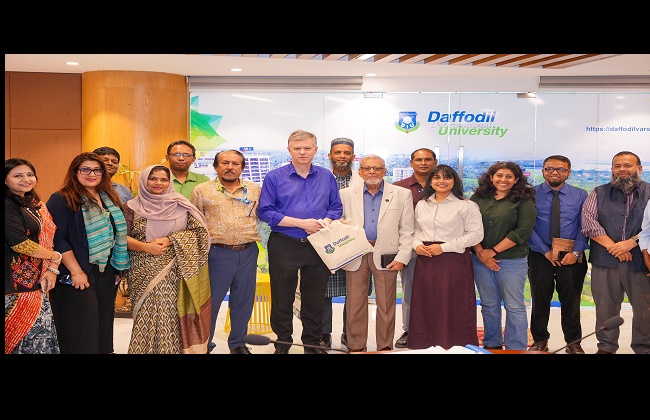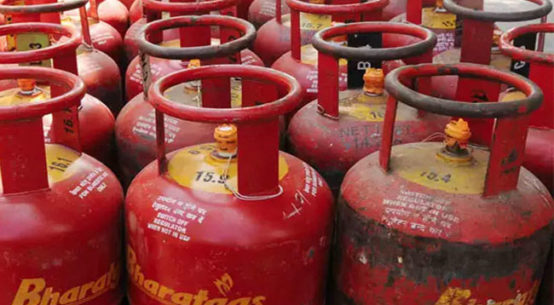
Daffodil International University (DIU), in collaboration with the Global Law Thinkers Society (GLTS), recently organized an important event titled “Pre-COP29 Group Discussion: Advancing Sustainable Living & Green Economy for Climate Action”. The event took place at the Conference Room, Knowledge Tower, Daffodil Smart City (DSC), DIU. It brought together academics, representatives from civil society organizations (CSOs), NGOs, government officials, and other stakeholders to discuss Bangladesh’s role and contributions to global climate action in preparation for the 29th Conference of the Parties (COP29), scheduled for November 2024 in Baku, Azerbaijan. With nearly 200 countries participating, COP29 serves as a pivotal platform for assessing global progress on climate goals, negotiating commitments, and fostering international cooperation to address climate change.
Dr. Mahfuza Parveen, Director of the Division of Research and Associate Professor of Department of Environmental Science and Disaster Management (ESDM) at DIU, delivered the keynote speech. She highlighted the importance of Bangladesh’s initiatives to a green economy and DIU’s role in climate action through its educational programs, research, and sustainability initiatives. She emphasized that DIU’s leadership in sustainability has been recognized globally through top rankings, including 1st position among public and private universities in Bangladesh in the THE Impact Rankings 2024, top private university and 2nd in Bangladesh in the QS World Sustainability Rankings 2024, and 1st in Bangladesh and 200th globally in the UI-Greenmetric Rankings 2023. She further elaborated on how these achievements reflect DIU’s commitment to integrating sustainability into its core values, research, and community practices.
During the discussion, Dr. David Dowland, Registrar of BRAC University, expressed gratitude for mobilizing youth engagement in climate action. He emphasized the critical role of social activism in holding governments’ accountable and called for stronger collaboration among universities to amplify youth voices. He also highlighted the importance of supporting countries like Bangladesh, which face the disproportionate impacts of climate change despite their low carbon emissions.
Ms. Raoman Smita, President of GLTS, shared her vision for advancing sustainable living and economic resilience. She discussed GLTS’s youth-driven advocacy and initiatives. She emphasized the need for coordinated action between Bangladesh’s National Adaptation Plan and its Nationally Determined Contributions (NDCs), highlighting that climate finance should be regarded as a right, not a loan. She invited DIU to collaborate with GLTS on future initiatives, highlighting the importance of fostering both climate adaptation and mitigation.
Mr. Subir Kumar Saha, Senior Coordinator of the Centre for Disability in Development (CDD) Bangladesh, reflected on Bangladesh’s strengths in disaster management based on his experiences at COP28. He stressed the need to bridge the gap between climate policy and implementation, advocating for nature-based solutions and calling on Bangladesh to make a compelling case for the loss and damage fund at COP29.
Mr. S. M. Arafat, National Expert, Biomedical Waste Management, Consumer Awareness and Action, UNIDO highlighted the exploration of environmental awareness campaigns and waste management strategies in the educational institution of Bangladesh. Muhammad Sharifur Rahman, Chairman, Country Director, Global Forum for Sustainable Rural Development drew on his experiences in Australia, describing clean city initiatives such as the “Don’t Trash My Home” campaign and advocated for adopting similar policies in Bangladesh. Responding to questions about DIU’s waste management, Dr. Mahfuza Parveen stressed that sustainable habits should be nurtured from a young age, and she highlighted DIU’s ongoing efforts in environmental consciousness and green initiatives.
Mr. Khalid Md. Bahauddin, Assistant Professor, FGS, DIU acknowledged the challenges Bangladesh faces in managing waste and praised DIU’s stringent waste management systems. He noted DIU’s proactive approach to maintaining an effective framework that ensures a clean and sustainable campus, setting an example for others to follow. Ms. Farhana Mahmud from SPRIHA spoke about the importance of inclusivity in climate adaptation, advocating for the involvement of persons with disabilities (PWDs) to ensure equitable outcomes. Md. Monir Hossain Chowdhury, General Secretary, Environmental Research and Development Alternatives focused on the biodiversity conservation in the face of changing climate.
Professor Dr. M. R. Kabir from the Department of Civil Engineering, DIU discussed the resilience of Bangladeshi communities in the face of climate challenges and the need for innovative solutions and integrating climate-resilient crops in local farming calendars. He also gave an overview of DIU’s initiatives and future plans to become DIU a sustainable green campus in Bangladesh. Professor Dr. Md. Shahjahan, Department of Public Health; Mr. Md. Fouad Hossain Sarker along with other faculty members of DIU highlighted the research contributions of different departments of DIU in advancing sustainable development goals nationally and internationally.
Professor Dr. S.M. Mahbub Ul Haque Majumder, Pro-Vice Chancellor; Dr. Mohammed Nadir Bin Ali, Registrar; Professor Dr. Md. Bellal Hossain, Acting Dean of the Faculty of Health and Life Sciences and Dr. Mohamed Emran Hossain, Associate Professor of Development Studies and Member of the Board of Trustees joined the discussion. Their insights reaffirmed DIU’s commitment to sustainability and its proactive engagement in global climate discussions.
Through this event, DIU demonstrated its leadership in promoting environmental stewardship and sustainable development, aligning with the objectives of the Paris Agreement. By partnering with GLTS, an international network of changemakers committed to sustainability and justice, DIU is working to empower young leaders and contribute meaningfully to global climate action. The Pre-COP29 discussion reaffirmed the need for collaborative efforts to reduce greenhouse gas emissions, promote sustainable development, adapt to climate change, and mobilize climate finance. It highlighted DIU’s commitment to shaping the global climate agenda and ensuring Bangladesh’s active participation in addressing the most pressing environmental challenges of our time.


